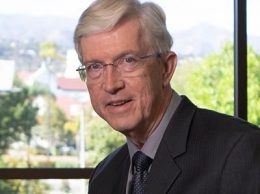Obamacare stays, California taxes rise and gridlock returns to D.C.
The votes have been counted and now California and the U.S. face a slightly changed political landscape but a series of new realities.
Obamacare will not be repealed, Proposition 30 passed despite a furious advertising assault and Latino voters helped put a Democrat into a congressional seat that represents most of Ventura County.
Some further thoughts:
One of the biggest winners on Nov. 6 was not even on the ballot. Gov. Jerry Brown bet his decades-long political legacy on Prop. 30, a bold move to raise taxes and deal with California’s own fiscal cliff.
Although California will now impose some of the highest personal income and sales taxes in the nation, Brown’s measure carried the day. Voters bought into his argument that he had already met his obligations halfway through budget cuts and needed an extra $6 billion a year in revenue to fund schools and higher-education institutions.
On the education heavy Central Coast, passage of Prop 30 is largely a plus. CSU Channel Islands, UC Santa Barbara and Cal Poly San Luis Obispo will be huge beneficiaries of an additional $500 million for the University of California and California State University systems.
Because the taxes are retroactive to Jan. 1, 2012, there will be an immediate windfall and probably credit upgrades for owners of California general obligation bonds. But economic development types will be holding their breath over the longer term impact on corporate relocations and new jobs.
If Brown is smart, he’ll turn to Lt. Gov. Gavin Newsom and Assemblymember Jeff Gorell, whose “Gold Team” approach to luring business will need a new spark.
On congressional and state races, it looks like the region I have dubbed the Green Coast because of its environmental legacy is now the Blue Coast. Lois Capps and newcomer Julia Brownley won House races and Hannah Beth-Jackson defeated Mike Stoker to gain a State Senate seat. Brownley becomes one of seven expected pickup seats in the House for the Democrats.
Meanwhile on the Central Coast, the city of Santa Maria marks a breakthrough, electing its first female mayor, Alice Patino.
The bottom line on the Nov. 6 results is that voters put their faith in candidates who promised to fund education, to support Obamacare and to provide a path to well paying jobs.
These voters will be bitterly disappointed if the economy falters, if education does not lead to greater economic opportunity, and if the governor’s promised $6 billion in new revenue falls short.
That means California and the U.S. will have to pivot quickly to encourage new company formation and economic growth.
For California specifically, it means taking steps to end what could be a slow bleeding of headquarters and highest paying jobs to other, lower-taxed states. And that could mean taking a second look at the state’s regulation-heavy oversight regimes and providing incentives for manufacturers and others, particularly exporters, to expand.
There is also a pension crisis that has been entirely left out of the discussion thus far.
For the U.S., it means finding a path, presumably along the lines of the Bowles-Simpson proposals to reform Medicare and Social Security, to reform taxes and avoid the fiscal cliff.
The new political realities will emerge quickly in Sacramento and Washington, D.C. And the winners will face tough decisions about how to turn their promises of economic opportunity into new businesses and better paying jobs that don’t require massive government support.
• Contact Editor Henry Dubroff at hdubroff@pacbiztimes.com.











